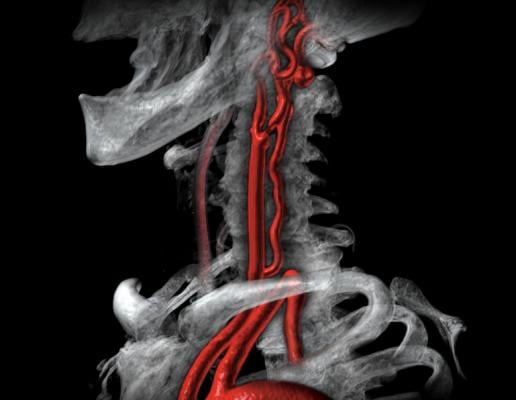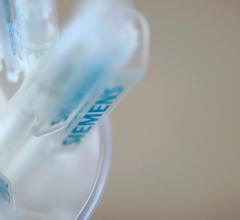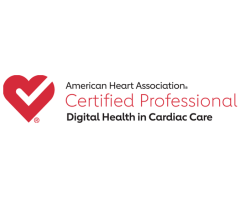
A carotid artery atherosclerotic plaque blockage at the bifurcation seen here can cause strokes. The stenting these lesions is a less invasive way of treating than open vessel surgery. The SVS has issued guidelines to help guide credentialing for the carotid stent procedure. Image from Vital Images.
July 9, 2020 — The Society for Vascular Surgery (SVS) has released a clinical competence statement on training and credentialing for trans-carotid artery revascularization (TCAR) to ensure that patients who are at risk of a stroke receive safe and effective preventative care with this new and promising technology by an experienced and appropriately trained physician
Patients with atherosclerosis of the carotid arteries are at increased risk of stroke. Until fairly recently, strategies to reduce the risk of stroke in these patients were limited to medication and, in appropriately selected patients, a surgical procedure known as a carotid endarterectomy where the narrowing is removed through an incision in the neck. More recently, a less invasive approach has been developed, carotid artery stenting (CAS). In CAS, a stent is placed in the carotid artery after being navigated from the femoral, or groin, artery through the vascular system and finally to the patient’s neck under fluoroscopic imaging.
Transfemoral CAS has been found to have many of the advantages of a minimally invasive technique, including shorter hospitalization and recovery, and a reduction in cardiac complications. However, the risk of stroke and mini-strokes around the time of the procedure is higher with transfemoral CAS than is seen with carotid endarterectomy. After the initial peri-procedural period, both CAS and endarterectomy provide similar protection from stroke.
TCAR has been developed as an attempt to combine the advantages of endarterectomy and CAS. Early results are promising, as stroke rates around the time of the procedure are lower than those seen after CAS. Briefly, TCAR involves a small incision at the base of the neck – much smaller than the incision necessary for endarterectomy – and the placement of a stent directly into the carotid artery under fluoroscopic guidance but without the need to navigate the entire vascular system, as with transfemoral CAS. This reduces the risk of stroke during the procedure. An added safety measure is the use of a flow reversal system that prevents atherosclerotic particles from traveling to the brain and causing a stroke.
As a combined open and minimally invasive stenting procedure, TCAR requires specialized equipment as well as knowledge and skills. The SVS writing group, chaired by Brajesh Kumar Lal, M.D., University of Maryland Medical System, considered the knowledge and skillset necessary to perform TCAR, both in instances of no or minimal TCAR experience and when a physician has had significant TCAR experience. The writing group members also considered specific instances when the required skills are provided by a team of physicians, rather than an individual. Three credentialing pathways are proposed and include requirements for education, experience with carotid endarterectomy and percutaneous arterial interventions, TCAR training and initial case proctoring. The authors also included requirements for tracking results following TCAR as a quality assurance measure.
Vascular surgeons have been at the forefront of developing innovative and less invasive therapies that benefit patients with diseases of the arteries and veins.
“The introduction of new techniques and technology in medicine must be accompanied by careful consideration of the new cognitive and technical skills that we will need to perform the procedure safely,” Lal said. “This document aims to provide that guidance to individual physicians and hospital credentialing committees.”
TCAR is another in the long line of these new technologies and this SVS Clinical Competence Statement on Training and Credentialing for TCAR is an important guiding resource.
Read the new guideline at http://b.link/TCARCompetencyStatement.
The Society for Vascular Surgery (SVS) is a not-for-profit professional medical society, composed of specialty-trained vascular surgeons and professionals, which seeks to advance excellence and innovation in vascular health through education, advocacy, research and public awareness.
Related Carotid Stenting Content:
Hoag Performs First Robotic Carotid Artery Stenting on West Coast
TCAR Achieves Favorable Outcomes Versus Carotid Endarterectomy in CAD Patients
Carotid Stenting Being Evaluated by Society for Vascular Surgery Patient Safety Organization
GlobalData: Stenting Viable Alternative to Surgery in Carotid Artery Stenosis
Study Finds Wide Variation in Carotid Artery Stenting Outcomes


 November 14, 2025
November 14, 2025 









